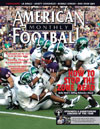AMERICAN FOOTBALL MONTHLY THE #1 RESOURCE FOR FOOTBALL COACHES
Article CategoriesAFM Magazine
|
AFM Subscribers Ask...with Ron Zook© More from this issueIllinois Head Coach Ron Zook and his staff and players recorded one of the greatest turnarounds in the last decade with the team’s performance last fall. The Illini, 2-10 in 2006, finished the season with a 9-3 record, a major upset win over Ohio State in Columbus and a berth in the Rose Bowl. That turnaround (+7) was tops among all Football Bowl Subdivision teams. Known as a tireless worker and recruiter, Zook’s first two campaigns resulted in an overall 4-19 record. But his recruiting paid off with many underclassmen returning in 2008 and a strong freshman class coming to Champaign in the fall. Zook has logged 33 years of coaching experience at the collegiate, high school and professional level. He previously was the head coach at Florida and, before that, was the DC for the New Orleans Saints. Zook began his coaching ....The full article can only be seen by subscribers. Subscribe today!
|
|
|||||||
| HOME |
MAGAZINE |
SUBSCRIBE | ONLINE COLUMNISTS | COACHING VIDEOS |
Copyright 2026, AmericanFootballMonthly.com
All Rights Reserved





